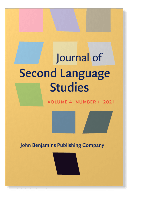
Journal of Second Language Studies
Scope & Guideline
Advancing Language Learning Through Innovative Research
Introduction
Aims and Scopes
- Second Language Acquisition (SLA) Research:
The journal publishes studies that explore the processes and factors involved in acquiring a second language, including cognitive, social, and contextual influences. - Language Processing and Production:
Research on how second language learners process and produce language in real-time, including studies on fluency, comprehension, and the cognitive mechanisms underlying these processes. - Pedagogical Methods and Interventions:
Studies investigating the effectiveness of various teaching methods and interventions in second language education, including task-based learning, feedback mechanisms, and strategy instruction. - Cross-Linguistic Influence:
Exploration of how learners' first languages affect their acquisition and use of a second language, including studies on transfer effects and interlanguage development. - Language Assessment and Evaluation:
Research focused on methodologies for assessing language proficiency and the effectiveness of language learning interventions, utilizing both traditional and innovative assessment techniques. - Sociolinguistics and Language Identity:
Investigations into the social dimensions of language learning, including identity formation, agency, and the role of culture in second language acquisition.
Trending and Emerging
- Technology-Enhanced Language Learning:
There is a growing interest in how technology, such as apps and online platforms like Duolingo, affects second language acquisition and learner engagement, reflecting the increasing integration of digital tools in language education. - Plurilingualism and Multilingual Education:
Research on cultivating plurilingual identities among learners is on the rise, emphasizing the importance of recognizing and valuing multiple languages and cultures in the language learning process. - Cognitive and Affective Factors in Language Learning:
Studies focusing on the interplay between cognitive aspects (like working memory) and emotional factors (such as anxiety) in language learning are gaining traction, acknowledging the complex nature of language acquisition. - Neuroscientific Approaches to Language Processing:
Emerging research employing neuroscientific methods to understand language processing in second language learners indicates a trend towards interdisciplinary approaches that bridge linguistics and cognitive science. - Contextualized Interactional Competence:
There is an increasing focus on developing measures for interactional competence that take into account the contextual factors influencing communication, moving beyond traditional linguistic competence assessments.
Declining or Waning
- Traditional Grammar Instruction:
There appears to be a decreasing emphasis on studies solely focused on traditional grammar instruction methods, as contemporary research increasingly favors communicative and contextualized approaches to language teaching. - Purely Theoretical Linguistic Models:
Research that relies strictly on theoretical models without empirical validation seems to be less prevalent, suggesting a shift towards studies that emphasize practical applications and evidence-based practices. - Static Views of Language Proficiency:
The journal is moving away from static, one-dimensional assessments of language proficiency, indicating a trend towards dynamic, process-oriented views of language learning and development.
Similar Journals

Yuyan Kexue-Linguistic Sciences
Illuminating Language Through Interdisciplinary InsightsYuyan Kexue-Linguistic Sciences, published by SCIENCE PRESS, is a pivotal academic journal dedicated to the field of linguistics. With its ISSN of 1671-9484, this journal seeks to explore and illuminate various linguistic phenomena, contributing significantly to the understanding of language in both theoretical and applied contexts. Emphasizing interdisciplinary research, it welcomes contributions that bridge linguistics with areas such as cognitive science, sociology, and communication studies. Although it currently does not offer open access, Yuyan Kexue-Linguistic Sciences aims to provide a platform for researchers, professionals, and students alike to engage with cutting-edge studies and emerging trends in linguistics. Its publication location in Beijing positions it as a vital contributor to the global discourse in the linguistic sciences, catering to both a national and international audience. As the journal continues to grow, it aspires to maintain high academic standards and foster scholarly exchange for years to come.
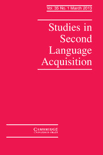
STUDIES IN SECOND LANGUAGE ACQUISITION
Navigating the evolving landscape of second language studies.STUDIES IN SECOND LANGUAGE ACQUISITION, published by Cambridge University Press, is a premier journal dedicated to advancing the field of second language acquisition. With an ISSN of 0272-2631 and an E-ISSN of 1470-1545, this journal has carved its niche as a leading resource for scholars and practitioners alike since 1978. Recognized in Q1 quartiles across both Education and Linguistics and Language, and ranked within the top 2% in its fields according to Scopus, it provides a platform for cutting-edge research that addresses the complexities of language learning and teaching. Although it does not currently offer open access, the journal remains widely accessible through institutional subscriptions, ensuring that groundbreaking research reaches a global audience. With a focus on empirical studies, theoretical discussions, and innovative methodologies, STUDIES IN SECOND LANGUAGE ACQUISITION is essential for those seeking to deepen their understanding of language education, making it a must-read for researchers, educators, and students committed to the evolving landscape of language acquisition.
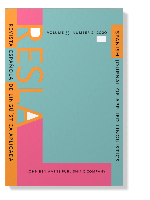
Revista Espanola de Linguistica Aplicada
Connecting scholars to shape the future of language studies.Revista Espanola de Linguistica Aplicada is a prominent academic journal published by John Benjamins Publishing Co, specializing in the interdisciplinary fields of linguistics, education, and e-learning. With its ISSN 0213-2028 and E-ISSN 2254-6774, the journal has established a significant presence in Spain and beyond, showcasing innovative research and contributions in applied linguistics. The journal is recognized for its rigorous peer-review process and maintains impressive Scopus rankings, notably within the 72nd percentile for Arts and Humanities and 68th percentile for Social Sciences, reflecting its critical role in advancing the study of language and education. As of 2023, it holds a Q3 rank in Education and a Q2 rank in Linguistics and Language, underscoring its influence and relevance in these disciplines. Targeted at researchers, educators, and students alike, the journal aims to facilitate knowledge exchange and provide a platform for discussions that shape the future of linguistics.

BRAIN AND LANGUAGE
Bridging Insights in Psychology, Speech, and LanguageBRAIN AND LANGUAGE is a premier journal published by Academic Press Inc Elsevier Science, dedicated to fostering scholarly communication in the fields of Cognitive Neuroscience, Linguistics, Psychology, and Speech and Hearing. With its ISSN 0093-934X (Print) and 1090-2155 (Online), the journal has established a significant presence since its inception in 1974, continuing to provide valuable insights into the intricate relationship between brain function and language processing. This journal is highly regarded, boasting a 2023 ranking of Q1 in Linguistics and Language, reflecting its influential contributions to the field, alongside Q2 rankings in categories such as Cognitive Neuroscience and Experimental Psychology. With a rigorous peer-review process, it serves as an essential resource for researchers and professionals seeking to deepen their understanding of language mechanisms and their cognitive underpinnings. Despite not being an Open Access journal, BRAIN AND LANGUAGE ensures that its articles are widely accessible and of high quality, making it an indispensable platform for both emerging and established scholars aiming to expand the boundaries of research in language and cognition.
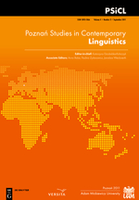
Poznan Studies in Contemporary Linguistics
Navigating the complexities of contemporary language.Poznan Studies in Contemporary Linguistics, published by DE GRUYTER MOUTON, is a pivotal journal in the field of linguistics, with an ISSN of 0137-2459 and an E-ISSN of 1897-7499. Located in Germany, this esteemed journal has consistently contributed to the academic landscape since its inception. As of 2023, it holds a Q2 category rank in Linguistics and Language and boasts commendable Scopus rankings, featuring in the 69th percentile for Arts and Humanities and the 66th percentile for Social Sciences. The journal emerges as a vital platform for scholars to explore contemporary linguistic theories and practices, making it an essential resource for researchers, professionals, and students alike. With a converged publication period from 2007 to 2024, it aims to facilitate a deeper understanding of linguistic advancements and trends. While the journal currently does not offer open access, its rigorous peer-review process ensures the highest quality of published research, strengthening its role as a leading discourse in the dynamic field of linguistics.
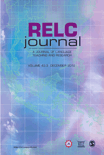
RELC Journal
Innovating Language Education Through Rigorous ResearchRELC Journal, published by SAGE Publications Ltd, stands as a leading platform in the fields of Education and Linguistics, boasting an impressive Q1 ranking in both categories according to the latest metrics. Established in 1970 and continuing its commitment to academic excellence through 2024, the journal features rigorous peer-reviewed research that explores the intersections of language, culture, and pedagogy. With a notable Scopus ranking that places it in the 98th percentile for both Language and Linguistics (Rank #16/1088) and Education (Rank #91/1543), the RELC Journal is essential for scholars, educators, and practitioners seeking to contribute to and stay abreast of cutting-edge developments in their respective fields. Although currently not open access, the journal remains accessible to a diverse audience and invites contributions that challenge conventional perspectives and inspire innovative practices in language education.

Language and Cognition
Innovating Research at the Crossroads of Language and ThoughtLanguage and Cognition is a premier peer-reviewed journal published by Cambridge University Press, dedicated to advancing the fields of language, linguistics, and cognitive psychology. With an ISSN of 1866-9808 and E-ISSN of 1866-9859, it has rapidly established itself as a pivotal resource for researchers, educators, and practitioners alike. Recognized for its rigorous scholarship, the journal holds a Q1 ranking in Linguistics and Language and a Q2 ranking in Experimental and Cognitive Psychology for 2023, reflecting its esteemed positioning within the academic community. Since transitioning to open access in 2023, it has broadened its reach, making cutting-edge research accessible to a global audience. The journal's emphasis on interdisciplinary studies ensures a comprehensive exploration of the interactions between language and cognitive processes, fostering deeper insights and fostering collaboration across domains. Researchers and professionals looking to stay at the forefront of advancements in these vital areas will find Language and Cognition an invaluable platform for disseminating their findings and engaging with contemporary debates.
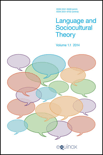
Language and Sociocultural Theory
Pioneering Research at the Intersection of Language and CultureLanguage and Sociocultural Theory, published by EQUINOX PUBLISHING LTD, stands as a vital resource for scholars in the domains of linguistic studies and cultural theory. With its ISSN 2051-9699 and E-ISSN 2051-9702, this UK-based journal has consistently achieved Q1 rankings in both Cultural Studies and Linguistics and Language as of 2023, demonstrating its significant impact within the academic community. The journal's position is further affirmed by its rankings in Scopus, where it occupies the 80th percentile in Cultural Studies and the 72nd percentile in Linguistics and Language, making it a leading platform for cutting-edge research. Though not an Open Access journal, it provides critical insights into the interconnectedness of language and sociocultural dynamics, making it essential reading for researchers, professionals, and students eager to explore the complexities of human communication. Spanning converged years from 2014 to 2023, the journal presents a rich collection of scholarly articles that strive to advance the field and inspire further academic inquiry.
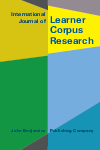
International Journal of Learner Corpus Research
Exploring the Intersection of Linguistics and EducationThe International Journal of Learner Corpus Research (ISSN: 2215-1478, E-ISSN: 2215-1486), published by JOHN BENJAMINS PUBLISHING CO, stands at the forefront of research in the fields of education and linguistics, with a notable impact demonstrated by its Category Quartile rankings of Q2 in Education and Q1 in Linguistics and Language for 2023. This distinguished journal, based in the Netherlands, presents cutting-edge studies that focus on learner corpus research—an area that merges linguistic analysis with practical applications in language learning and teaching. Spanning an impressive convergence period from 2015 to 2024, it has established itself as a vital resource for researchers, educators, and students eager to explore the nuances of language acquisition through empirical data. Notably, its high Scopus rankings underscore its significance within the academic community, making it a must-read for those dedicated to advancing the understanding of learner language dynamics.
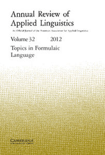
Annual Review of Applied Linguistics
Connecting researchers and practitioners in the world of applied linguistics.The Annual Review of Applied Linguistics, published by Cambridge University Press, stands as a premier journal in the realm of linguistics and psychology, with an impressive impact factor identifying its significance: ranking in the Q1 quartile across both fields in 2023. With an ISSN of 0267-1905 and an E-ISSN of 1471-6356, this journal endeavors to provide comprehensive and insightful reviews covering an array of topics within applied linguistics, thus supporting researchers, professionals, and students in advancing their understanding and expertise. Operating from its base in Cambridge, United Kingdom, the journal has maintained a consistent commitment to scholarly excellence since its inception, accelerating discussions on critical issues and emerging research trends from 2005 to 2024. Notably, it holds a prestigious position in Scopus, ranked #26 in Language and Linguistics and #30 in Social Sciences, showcasing its influence and contribution to the scholarship in the field. The Annual Review of Applied Linguistics thus stands as an essential resource for anyone engaged in linguistic research and application.